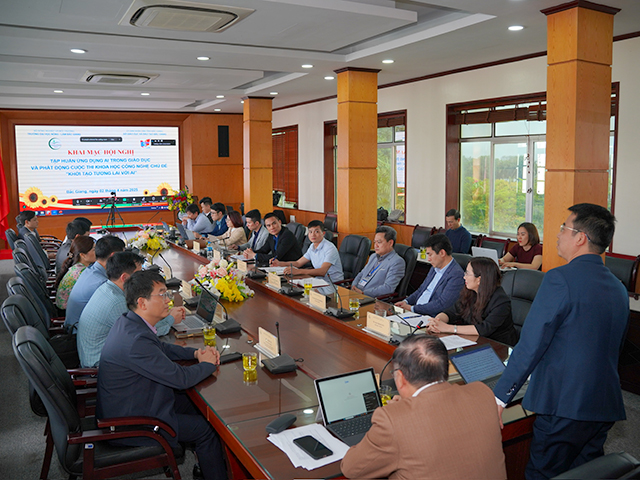
(TTO) – In many countries, universities have abundant income from research projects and technology transfer. In the photo: graduate students doing research at the Stem Cell Institute, University of Natural Sciences, Vietnam National University, Ho Chi Minh City – Photo: TRUNG NHAN
Dr. Ly Qui Trung – senior advisor of Western Sydney University (Australia) – said so in an interview with Tuoi Tre on the topic of university autonomy and tuition fees.
According to Mr. Trung, the adjustment of university tuition fees is necessary, but the problem is how not to negatively affect the learning path of the young generation.
Finding solutions to support the increase in university tuition fees is more beneficial and reasonable in my opinion than finding solutions to curb it so that the university’s output quality will never be significantly improved.
Dr. Ly Qui Trung
Don’t do what you want to do
* While the issue of university autonomy in Vietnam is relatively new, in Australia this seems to be an “old” thing?
– All universities in Australia have long been autonomous, including autonomy in terms of teaching content (academic autonomy), organizational and administrative autonomy (organizational autonomy), and especially autonomy in setting standards. tuition fees and financial autonomy.
Even the recruitment or appointment of professors or some school leadership positions is completely autonomous.
This does not mean that universities can do whatever they want, but still have to follow the general regulations and guidelines of the Government. For example, in the matter of tuition fees, schools are free to set tuition fees that are in line with their quality and reputation compared to the market, but must not exceed the annual ceiling set by the Government.
Similar to the amount of “interest” if any (public schools in Australia call it “surplus”), it will not go to anyone’s pocket, but will be actively used by the school for other purposes. such as investing in infrastructure, encouraging research or improving the teaching quality of teachers.
Some universities even use part of this surplus money to invest in projects that can generate money to strengthen financial capacity. So to run a university really effectively, the head is not only the principal but also a true CEO.
* According to your observations, what role does tuition fees currently play in the “revenue” of Australian universities?
In Australia, the main source of revenue for universities is still tuition fees. But unlike Vietnam, Australian schools also receive a very rich source of tuition from international students from other countries. This tuition fee is sometimes even higher than the tuition fee from local people, especially for reputable universities.
In addition, schools receive a substantial amount of money from the federal government, as well as payments for research ordered by both federal, state, and local governments.
The habit of using universities as a consulting brain is a very good habit in developed countries, because it both values knowledge before big decisions and provides an important source of funding to institutions maintain and enhance research capacity.
In addition, I see that universities in Australia or the US also do very well in mobilizing sponsorships, support and donations from benefactors and individuals interested in education. And to specifically encourage social contributions to universities, the Australian Government offers a tax deduction for those contributions.
The important role of banks
* On the independent steps of Vietnamese universities, many people believe that increasing university tuition fees is one of the mandatory jobs to increase quality. Others are quite “stunned” with the increase compared to the common ground. What do you think about this trend?
– In my opinion, if universities want to produce high-quality products (students), there is no other way than to have a methodical investment from infrastructure to the quality of teaching staff. not to mention the need to continuously improve research ability.
After all, all of this requires money, in addition to other important things, of course. But without money it is difficult to do much. Therefore, it is necessary to increase tuition fees or, rather, adjust tuition fees to suit the desired quality of society and to be able to compete with the education of other countries in the region and the world.
The problem is how universities can increase tuition fees without disturbing or negatively affecting the learning path of a whole generation of young people. For example, in Australia, on the one hand, universities offer quite high tuition fees, but on the other hand, the Government offers reasonable support programs.
* What is the specific solution, sir?
– For example, if you and your family cannot afford to pay tuition fees, you can completely borrow money from the Australian Government to pay (HECS-HELP program), with zero interest. This loan amount will be connected to the tax department so that when they graduate with a job with an income above a certain minimum, it will automatically be deducted gradually.
That is what happens in a country with a well-off economy like Australia, but for an emerging economy like Vietnam, a creative and extremely dynamic solution is required. The supporting role of banks becomes very important when the government budget is limited.
This is a national problem, not just the education sector. Finding solutions to support the increase in university tuition fees is more beneficial and reasonable in my opinion than finding solutions to curb it so that the university’s output quality will never be significantly improved. .
Must be delicate and creative when performing university autonomy
I also want to see significant reforms in the field of education from content to the way universities operate and organize, to produce young generations with both qualifications, attitudes and ideas. right mindset, can compete with the world. University autonomy is one of the necessary steps on the educational reform journey, but its implementation obviously requires a lot of sophistication and creativity.
“So that tuition does not burden learners”

One of the factors young people consider when choosing a school is tuition – In the photo: students learn about schools at the 2022 University Admissions Festival organized by Tuoi Tre newspaper in Hanoi – Photo: NGUYEN BAO
This is the topic of a seminar organized by Tuoi Tre newspaper this morning, August 18, with the participation of education experts and representatives of universities. The seminar aimed to share solutions to increase revenue for schools from non-tuition activities to reduce pressure on tuition increases, reduce financial burden for learners as well as financial support policies for students. student.
Guests participating in the discussion include:
1. Dr. Bui Quang Hung – Vice President of University of Economics Ho Chi Minh City
2. Assoc. Prof. Dr. Tran Thien Phuc – Vice Rector of University of Science and Technology (National University of Ho Chi Minh City)
3. Dr. Quach Thanh Hai – Head of Training Department, Ho Chi Minh City University of Technology and Education
4. Assoc. Prof. Dr. Nguyen Ngoc Khoi – Head of Training Department, University of Medicine and Pharmacy, Ho Chi Minh City
5. Dr. Tran Duc Canh – member of the National Council for Education and Human Resource Development for the 2016-2021 term
6. MSc Bui Quang Trung – Head of Communication and Marketing Department, Nguyen Tat Thanh University
7. Assoc. Prof. Dr. Nguyen Minh Duc – Vice President of Van Hien University
Readers can follow the discussion at tuoitre.vn as well as ask questions or share views, perspectives and solutions with the guests of the seminar
Source: https://tuoitre.vn/








